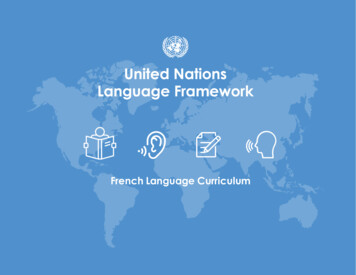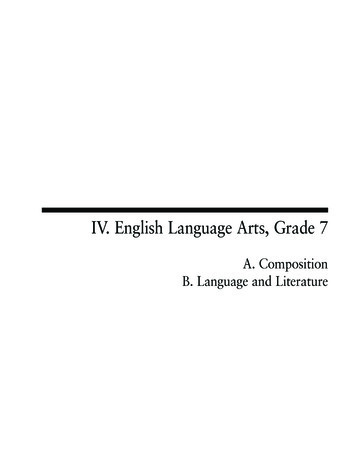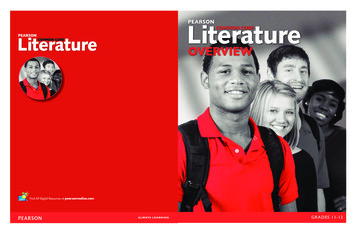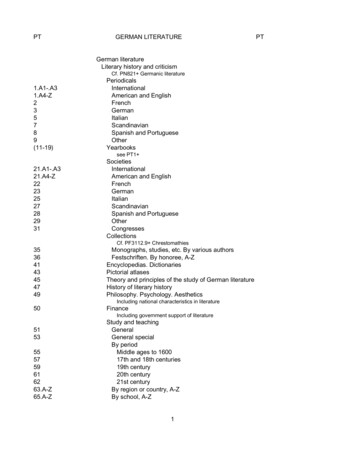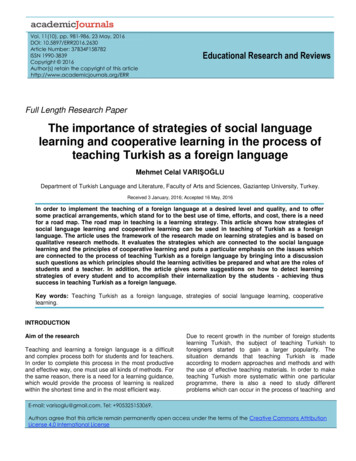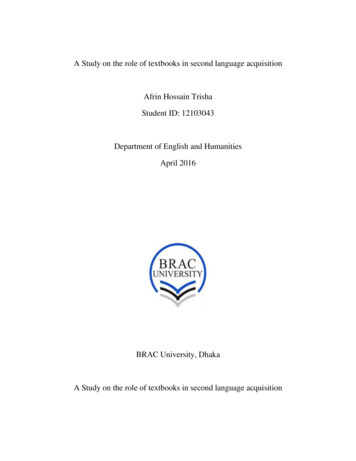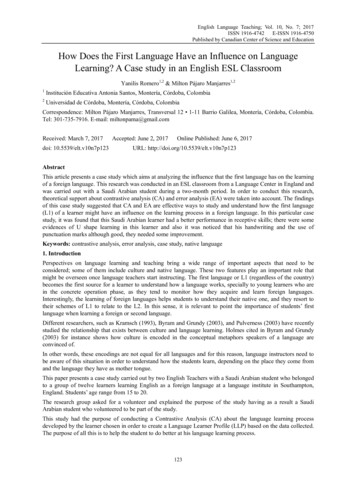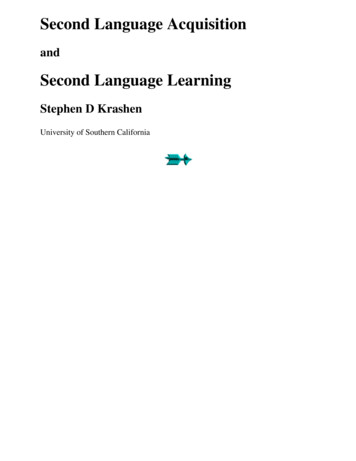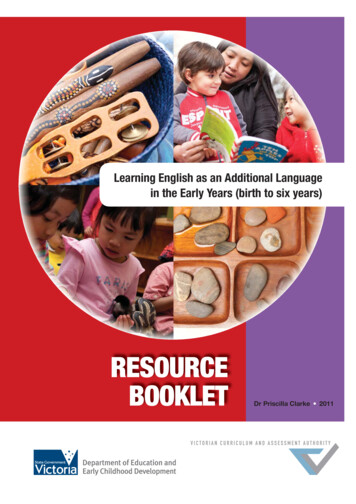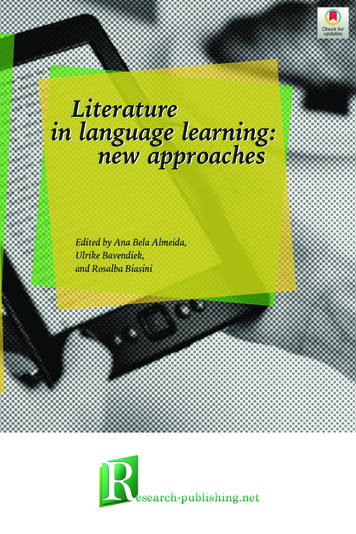
Transcription
Literature in language learning:new approachesEdited by Ana Bela Almeida,Ulrike Bavendiek, and Rosalba Biasini
Published by Research-publishing.net, a not-for-profit associationContact: info@research-publishing.net 2020 by Editors (collective work) 2020 by Authors (individual work)Literature in language learning: new approachesEdited by Ana Bela Almeida, Ulrike Bavendiek, and Rosalba BiasiniPublication date: 2020/09/14Rights: the whole volume is published under the Attribution-NonCommercial-NoDerivatives International(CC BY-NC-ND) licence; individual articles may have a different licence. Under the CC BY-NC-ND licence,the volume is freely available online 696) for anybody toread, download, copy, and redistribute provided that the author(s), editorial team, and publisher are properly cited.Commercial use and derivative works are, however, not permitted.Disclaimer: Research-publishing.net does not take any responsibility for the content of the pages written by theauthors of this book. The authors have recognised that the work described was not published before, or that itwas not under consideration for publication elsewhere. While the information in this book is believed to be trueand accurate on the date of its going to press, neither the editorial team nor the publisher can accept any legalresponsibility for any errors or omissions. The publisher makes no warranty, expressed or implied, with respect tothe material contained herein. While Research-publishing.net is committed to publishing works of integrity, thewords are the authors’ alone.Trademark notice: product or corporate names may be trademarks or registered trademarks, and are used only foridentification and explanation without intent to infringe.Copyrighted material: every effort has been made by the editorial team to trace copyright holders and to obtaintheir permission for the use of copyrighted material in this book. In the event of errors or omissions, please notifythe publisher of any corrections that will need to be incorporated in future editions of this book.Typeset by Research-publishing.netCover illustration, free to use, Pexels: -female-76942/Cover layout by 2020 Raphaël Savina (raphael@savina.net)ISBN13: 978-2-490057-69-6 (Ebook, PDF, colour)ISBN13: 978-2-490057-70-2 (Ebook, EPUB, colour)ISBN13: 978-2-490057-68-9 (Paperback - Print on demand, black and white)Print on demand technology is a high-quality, innovative and ecological printing method; with which the book isnever ‘out of stock’ or ‘out of print’.British Library Cataloguing-in-Publication Data.A cataloguing record for this book is available from the British Library.Legal deposit, France: Bibliothèque Nationale de France - Dépôt légal: septembre 2020.
Table of contentsvNotes on contributors1IntroductionAna Bela Almeida, Ulrike Bavendiek, and Rosalba Biasini7Literature, challenge, and mediation in 21st century language learningGeoff Hall15Literature in language learning in the UK context: from current A-levelsto universityIdoya Puig23Transnational perspectives in the Italian language class: the usesof non‑native literature to develop intercultural competenceCecilia Piantanida33Cento as a creative writing approach to language learningAmjad Alsyouf41Exploring literary texts to develop students’ creative writing skills:proposed activities for Spanish as a foreign languageCarmen Martín de León and Cristina García Hermoso51Developing soft skills with micro‑fiction: a close-reading experienceAna Reimão59‘La ballata dell’amore cieco’: a case study on the use of songs in Italianlanguage learningSalvatore Campisi69When the reader becomes the writer; creative writing approachesin the foreign language classroomAnke Bohm and Hanna Magedera-Hofhansl77French creative theatre in a course for beginners: the case of ‘Finissezvos phrases!’ by Jean TardieuGéraldine Crahay85Author indexiii
iv
Notes on contributorsEditorsAna Bela Almeida is Lecturer at the University of Liverpool where she teachesPortuguese language and lusophone studies. She studied modern Portugueselanguage and literature (BA, Lisbon, 2000) and Portuguese and Galician literatureand visual arts (MA, Vigo, 2006). She publishes on Portuguese literature andon didactics of Portuguese foreign language. Ana Bela is one of the foundingmembers of the Litinclass research group.Ulrike Bavendiek is Senior Lecturer in the Department of Modern Languagesand Cultures at the University of Liverpool and has been teaching Germanlanguage and linguistics in higher education since 1993. She graduated with aMagister Artium in German and Japanese studies (Göttingen, 1992) and holds aPh.D. in applied linguistics (Liverpool, 2006). She is the Director of CTELL, theUniversity’s Centre for Teaching Excellence in Language Learning.Rosalba Biasini is Lecturer in Italian at the University of Liverpool where sheteaches Italian language and culture. She studied classics and humanities (BA,L’Aquila, 2004), translation studies (MA, Manchester 2005), Italian literature(DPhil/Ph.D., Oxford, 2010), and didactics of Italian foreign language (MA,Ca’ Foscari, Venice, 2013). She publishes on the field of Italian literature anddidactics of Italian foreign language.ReviewersNicola Bermingham is Lecturer (Assistant Professor) in Hispanic studies at theDepartment of Modern Languages and Cultures, University of Liverpool. Sheis a specialist in sociolinguistics; her work focuses primarily on the contextsof Galicia (Spain) and Cape Verde. Her research interests include migrationstudies, minority languages, and education.Lisa Brennan is the Teacher Development Coordinator at the English LanguageCentre of the University of Liverpool, where she also teaches English forv
Notes on contributorsacademic purposes to current and prospective international students. Herwork draws on linguistics and educational psychology, and she is particularlyinterested in the influence of identity and culture on learning and teaching.Silvia González studied English philology at the University of Santiago deCompostela, as well as a Masters in advanced linguistics and the PGCE. In 2014,she started her career as a Spanish teacher at the University of Liverpool. Shealso completed a Masters in teaching Spanish as a foreign language and she hascollaborated with the University of Santiago.Jessica Iubini-Hampton's research aims to survey the level of vitality of twominority languages: Esperanto and Modenese. Before arriving at Liverpool,Jessica completed an MA in linguistics at the University of Manchester whereshe was awarded a Master’s Bursary by the Philological Society. Outside of herstudies, Jessica acts as Membership Officer and Book Reviews Editor for theInternational Ecolinguistics Association.Christian Jones is Senior Lecturer in TESOL and applied linguistics at theUniversity of Liverpool. He is co-author of Corpus Linguistics for Grammar:A guide for research (Routledge, 2015), and Successful Spoken English:Findings from Learner Corpora (Routledge, 2017). He is also editor ofPractice in Second Language Learning and Literature, Spoken Language andSpeaking Skills in Second Language Learning (Cambridge University Press(2018, 2019).Veronika Koeper-Saul is Lecturer in German in the Department of ModernLanguages and Cultures at the University of Liverpool, Erasmus Coordinatorfor German, and Modern Languages Resources Manager in the University’sLanguage Lounge. Her interests include approaches to independent learning,intercultural exchange, and teaching culture in the foreign language classroom.Jordi Sánchez is currently a lecturer of Spanish at the University of Liverpoolwhere he teaches undergraduate advanced students in their first year. He isvery interested in the use of technology as a means of blended learning and isvi
Notes on contributorscurrently researching this field as well as the use of flipped classrooms in highereducation and the use of Google Translate for language learning purposes.Federica Sturani has been teaching Italian language in various institutions ofhigher education in the UK for over 25 years. Her long standing interest in Italianlanguage teaching lead to several publications for the Teach Yourself series,including “Italian Tutor. Grammar and Vocabulary workbook”. She is currentlyUniversity Teacher at Liverpool University and Associate Tutor at Edge HillUniversity, Ormskirk.Stefania Tufi is Senior Lecturer in Italian studies at the University of Liverpool,UK. Her main research interests lie within sociolinguistics. Most recently shehas worked on borderscapes, language and memory, and linguistic constructionsof identity in transnational spaces. Her co-edited volume, ReterritorialisingLinguistic Landscape: Questioning Boundaries and Opening Spaces, waspublished in January 2020.AuthorsAmjad Alsyouf is Assistant Professor of English literature at Al-Balqa AppliedUniversity. He is a dynamic thinker and scholar of English and literary studies. Hisresearch interest is in using literature in language learning, poetry, comparativeliterature, medieval literature, and English romanticism. He has authored articlesabout literature, English learning, and a group of poems and intellectual essays.Anke Bohm is currently Language Tutor in German studies in the School ofArts, Languages, and Cultures at the University of Manchester. She has taughtGerman in Spain, Switzerland, and the UK in different institutional contexts.Her interests include flipped classroom approaches to teaching grammar andsecond language acquisition.Salvatore Campisi has worked as Lector in Italian at various UK universitiessince 2005 (Salford, Manchester, Leeds), and his interest in independent andvii
Notes on contributorsblended language learning has underpinned his teaching practice. He wasawarded a Ph.D. with a thesis on Hermann Hesse in 2011 and is currently theSenior Language Tutor in Italian at the University of Manchester.Géraldine Crahay is Assistant Teaching Fellow in French at Durham University.After a BA and an MA in French studies and a teacher training degree at theUniversity of Liège (Belgium), she completed a Ph.D. at Bangor University.Her research interests include gender studies, relations between literature andscience, and relations between language and dance.Cristina García Hermoso: Fellow of the Higher Education Academy andUNILANG Assessor. Senior Teaching Fellow and Senior Tutor in modernlanguages and linguistics at the University of Southampton. Second prize for theELE teacher of the year 2015, for the project “Manos a la obra”, (in collaborationwith Carmen Martín de León). Co-author of Palabras clave para organizar textosen español (Routledge, 2019).Geoff Hall has been Professor of English at the University of NottinghamNingbo China since 2011. He has taught, trained teachers, and spoken atvarious invited professional events in Europe, Asia, and globally. Specialresearch areas include uses of literature in language learning, including awidely cited book for Macmillan/Springer, Literature in Language Education(second edition, 2015).Hanna Magedera-Hofhansl, born in France, and raised in Austria, did aMaster’s degree in French, Portuguese, and Lutheran theology at the universitiesof Vienna and Strasbourg. After working at the French Cultural Institute inVienna, she came to the University of Liverpool in 2001 and is now Lecturer inGerman language.Carmen Martín de León, MPhil., is Lecturer in the Department of ModernLanguages and Linguistics at the University of Southampton. She has publishedarticles, books, and chapters on philosophy and education. Her research interestsinclude independent learning, gamification, and literature in language teaching.viii
Notes on contributorsRecently, she co-authored the textbook Palabras clave para organizar textos enespañol (Routhledge, 2019), that focuses on discourse coherence.Cecilia Piantanida is Assistant Professor (Teaching) in Italian at the School ofModern Languages and Cultures of Durham University. She holds a doctoratein medieval and modern languages from the University of Oxford. Her researchengages with transnational and intercultural approaches to the teaching andlearning of modern languages, representations of origins and (un)rootedness incontemporary writing and classical reception studies.Idoya Puig is Senior Lecturer in Spanish at Manchester Metropolitan University.She has published a number of articles on Cervantes and sixteenth centurySpanish culture. She recently published Spanish Golden Age Texts in the TwentyFirst Century and she is currently exploring ways to harness new media to teachliterary classics and to bring literature back into the language class.Ana Reimão is Lecturer in Portuguese studies at the University of Liverpoolsince 2005 and a founding member of TROPO UK – the Association of Teachersand Researchers of Portuguese – which encourages scholarly research andpromotes good practice on aspects of learning and teaching Portuguese in orderto support the professional development of teachers.ix
x
IntroductionAna Bela Almeida1,Ulrike Bavendiek2, and Rosalba Biasini3A renewed interest in literature is gradually emerging in the foreign languagecurriculum as demonstrated in recent studies (e.g. Hall, 2015; Matos, 2012;Paran, 2010; Sell, 2005). The surge of research groups and new online toolson this topic, such as the Litinclass website (https://litinclass.wordpress.com/,Almeida, Puig, & Duarte, 2016) or the Literature in Language Learning andTeaching Research Network (https://lilltresearch.net/home/, Paran & Kirchhoff,2019) testifies to the growing relevance of this pedagogical approach to theteaching and learning of foreign languages. Both recent scholarship and classpractice provide evidence that reading literary texts helps students to developtheir language skills, as “[l]iterature exposes students to complex themes andfresh, unexpected uses of language” (Lazar, 1993, p. 15). Moreover, “[a]tpresent, students who are extensive travellers demand a different approachto the cultural dimension” (Matos, 2012. p. 7); the study of literature in thelanguage classroom provides these students with the intercultural skills thatare increasingly necessary in the contemporary globalised world. As educators,we can employ the study of literature to prepare students for dealing with thecomplexity of a globalised world long after graduation.But how can this approach be adopted in teaching and learning practice? Whatis the best way to use songs and poetry in the language classroom? How cancreative writing workshops help language learners, and what are the ethicalimplications of bringing literature to the language class? These were just a few1. University of Liverpool, Liverpool, United Kingdom; a.almeida@liverpool.ac.uk2. University of Liverpool, Liverpool, United Kingdom; u.bavendiek@liverpool.ac.uk3. University of Liverpool, Liverpool, United Kingdom; rosalba.biasini@liverpool.ac.ukHow to cite: Almeida. A. B., Bavendiek, U., & Biasini, R. (2020). Introduction. In A. B. Almeida, U. Bavendiek& R. Biasini (Eds), Literature in language learning: new approaches (pp. 1-6). pnet.2020.43.1089 2020 Ana Bela Almeida, Ulrike Bavendiek, and Rosalba Biasini (CC BY)1
Introductionof the questions addressed at the Literature in Language Learning Conference,which took place at the University of Liverpool on the 14th of June 2019, andattracted leading experts in the fields of English and Modern Foreign Languageslearning and teaching through literature4.Two overriding themes emerged from the conference. First, the role of literaturein the language classroom in a transnational world, where the majority oflanguage students have a multilingual and multicultural background, and wheretheir digitally mediated experiences and identities transcend the one-nationone-language-one-culture idea of traditional language teaching. In this context,fictional literary texts can invite students to adopt different viewpoints and thusenhance intercultural awareness. The second theme, embedded and driven bythe first, is the use of literary texts for creative appropriation, the way in whichstudents can be encouraged to actively engage with, rather than consume, literarywork.In this publication, we are pleased to offer in the form of short papers a selectionof the presentations delivered at the Literature in Language Learning Conference,which captures the intellectually stimulating atmosphere of the day.Geoff Hall opened the conference, and some elements of his keynote speech arecollected in the paper that we are happy to include in this volume. Hall discoversa new relevance of literature for language learning by positioning it clearly intoday’s globalised world. Based on the changing profiles of language students,their often multilingual and multicultural backgrounds and their digitallymediated interconnectedness, he identifies new aims for language learning tomeet the challenges of the evolving societies, arguing that literature is ideallysuited to meet these challenges in the classroom. Connecting with and throughliterary texts, students develop ‘mediation’ and intercultural communicationskills such as creativity, critical thinking, empathy, and emotional intelligence.Using an example from an undergraduate English class in China, Hall explains4. A brief account of the event can be found here: cellence/news/stories/title,1158700,en.html2
Ana Bela Almeida, Ulrike Bavendiek, and Rosalba Biasinithat different perspectives, knowledge, experiences, and values are negotiated inresponse to a literary text.While acknowledging the benefits of the use of literature for language learning,Idoya Puig, the second keynote speaker of the conference, provides animportant reminder that the actual experience of literary texts in the classroomis not always entirely positive. Students and teachers often perceive literatureas ‘difficult’, ‘time-consuming’, and ‘lacking in relevance’, and struggle withthe compulsory study of literary works in their language classes. On the otherhand, recent research quoted in her speech and paper clearly demonstrates theadvantages of using literary texts for language learning, advantages that arereflected in the new curricula from primary to A-level education. Puig concludesthat greater flexibility regarding the choice of text, as well as clear pedagogicalstrategies, are needed to foster a more positive attitude towards literature in thelanguage class.Moving into more practical spaces, a series of case studies illustrates the useof literature in classrooms today. Cecilia Piantanida takes the transnationalapproach further, using ‘migrant literature’ to teach intercultural skills in anItalian language class. Migrant literature offers both an inside and an outsideview of the target culture, challenging the binary oppositions of foreign versusnative culture, or first versus second language speaker. Through this approach,the students develop a critical awareness of cultural difference, as Piantanidademonstrates in her empirical study of a final year Italian language class, whereshe uses migrant literature both as a tool and a topic. By sharing the marginalrelation to the target language with the migrant author, the learners are able toreflect on the notion of identity and the effects that using a second language canhave on it.Other contributions focus on the creative engagement with literary texts, whichoften includes elements of creative writing or rewriting. Experimenting withcento poetry – the composition of poetry from verses selected from existingpoems – with students in a university English class, Amjad Alsyouf showsthat the use of appealing teaching material that allows for creative expression3
Introductioncan counteract language anxiety. The resulting poems demonstrate deepunderstanding and creative use of the target language.Imagination and creativity are also at the heart of three projects that CarmenMartín de León and Cristina García Hermoso developed to engage theirstudents with literary texts in Spanish language. Immersing themselves infictional worlds, learners are asked to write dialogues or continue stories,activities which allow them to use the language authentically yet creatively. Ina questionnaire following these activities, the students confirmed that the tasksallowed them to build empathy and to develop their imagination.Exploiting literature for creative purposes is shown to enhance motivationand to lead to deep appreciation of the language in class. Ana Reimão usesmicro-contos, short and concise literary texts, to foster soft transferable skills.In her paper she recounts a Portuguese class in which clear and stimulatingcommunicative purposes are created using micro-contos. As a consequence, herstudents engage affectively and cognitively in the learning process.Salvatore Campisi uses songs to develop linguistic skills and to raise students’cultural awareness in an advanced Italian class. Campisi carefully considers theadvantages and disadvantages of using music for language learning and, based onhis experience with a sequence of activities based on an Italian ‘ballad’, explainshow the activity enhanced students’ engagement with Italian language andculture, helping them to develop both their linguistic and cultural competency.Writers in residence schemes are a prestigious part of many university languagedepartments. Such residences are often the highlight of the academic year forboth students and staff. Reflecting on their experience of working with studentsof German before, during, and after an author’s residency, Anke Bohm andHanna Magedera-Hofhansl develop guidelines to make best use of such a visitfor student learning.As highlighted also in Puig’s paper, in spite of their motivational potential,literary texts are often considered to be ‘difficult’ due to the ‘special’ language4
Ana Bela Almeida, Ulrike Bavendiek, and Rosalba Biasiniused. As a consequence, the use of literary texts is not usually recommended inthe beginners language classroom. However, in her paper, Géraldine Crahaydiscusses the use of simple, playful theatrical texts at French elementary level,arguing that drama is particularly suitable for such use due to its dual nature asa written and oral text. Crahay shows how a carefully designed range of shortactivities helps her beginner students access and ‘celebrate’ the text. A creativerewriting and performing of the students’ plays is the culmination of the activitiesand evidence of students’ developing linguistic skills, as well as their creativity,cooperation, and critical thinking.With this volume and with the organisation of the Literature in Language LearningConference, we have offered a contribution to the current debate around the useof literature in language learning, providing what we believe are effective andoriginal ideas for both classroom practice and scholarly investigations. We hopethat these reflections and proposals will inspire language learning and teachingpractice as well as further research and discussions.AcknowledgementsWe would like to thank the University of Liverpool’s School of Histories,Languages, and Cultures (HLC) and the Centre for Teaching Excellence inLanguage Learning (CTELL) for their financial support towards the organisationof the conference and the publication of this volume.We are very grateful to the HLC Marketing, Recruitment, and Events team for theirpractical and logistics help; the staff at the University of Liverpool ManagementSchool for their support on the conference day; Karine Fenix from Researchpublishing.net for her priceless advice and patience; and our sponsor, EuropeanSchoolbooks, for organising a perfectly fitting display on the conference day.We would also like to thank the speakers and delegates of the Literature inLanguage and Learning Conference for creating a stimulating and enriching day,and all the reviewers of this volume for their insightful work.5
IntroductionWe would finally like to express our gratitude to Professor Diana Cullel Teixidor,Head of the Department of Modern Languages and Cultures (MLC) at the timeof the conference for her time and words of encouragement, and to colleaguesin MLC who gave us their advice and support. A special thanks goes to theItalian language assistants of the academic year 2018-19 for their help during thepreparation as well as on the day.ReferencesAlmeida, A. B., Puig, I., & Duarte, G. (2016). Literature in the foreign language class project.https://litinclass.wordpress.com/Hall, G. (2015). Literature in language education. Palgrave Macmillian.Lazar, G. (1993). Literature and language teaching: a guide for teachers and trainers.Cambridge University Press.Matos, A. (2012). Literary texts and intercultural learning: exploring new directions. PeterLang.Paran, A. (2010). More than language: the additional faces of testing and assessment in languagelearning and teaching. In A. Paran & L. Sercu (Eds), Testing the untestable in languageeducation (pp. 1-14). Multilingual matters. https://doi.org/10.21832/9781847692672-002Paran, A., & Kirchhoff, P. (2019). Literature in language learning and teaching. https://lilltresearch.net/home/Sell, J. (2005). Why teach literature in the foreign language classroom? Encuentro, Journal ofResearch and Innovation in the Language Classroom, 15, 86-93.6
1Literature, challenge, and mediationin 21st century language learningGeoff Hall1AbstractNew directions in language learning and teaching are evidenttoday. Students bring transnational, multicultural, multilingual,and digitally mediated experiences and identities into classrooms stillsometimes too much modelled on outdated one-language-one-cultureone nation ideologies. Literature’s value in these new circumstancesis to challenge readers to independent interpretations, learning, andcreativity, with refreshed understandings of what language, culture orindeed literature might be. In this paper I review some relevant recentinterventions into the foreign language education field, including areference to the Council of Europe’s (2018) Companion . I then give abrief example from my own use of a literary text in China.Keywords: literature in multilingual and multicultural language learning, interculturalcommunication, literary translation, mediation, literature in CEFR Companion 2018.1.Introduction and 21st century language learningIn the context of the call of Kramsch (2014) to recognise new multilingual andmulticultural contexts for language learning, in this paper I discuss the potentialof literature for intercultural communication and mediation – Common EuropeanFramework of Reference (CEFR) (Council of Europe, 2018). New curriculumdocuments globally ask language educators to promote wider and more complex1. University of Nottingham Ningbo China, Ningbo, China; geoff.hall@nottingham.edu.cn; https://orcid.org/0000-00028311-4024How to cite this chapter: Hall, G. (2020). Literature, challenge, and mediation in 21st century language learning. InA. B. Almeida, U. Bavendiek & R. Biasini (Eds), Literature in language learning: new approaches (pp. 7-13).Research‑publishing.net. https://doi.org/10.14705/rpnet.2020.43.1090 2020 Geoff Hall (CC BY)7
Chapter 1aims than simple language acquisition, including criticality, interculturalcommunication and empathy, creativity and innovation, independence, teamworking, ethics and emotional intelligence, and a host of other ‘21st centuryskills’ (Naji, Subramaniam, & White, 2019). Interestingly, these documentsalso increasingly allocate literature a role in pursuing such aims. The Councilof Europe’s (2018) Companion to their globally influential 2001 ‘Framework’document, intended to guide the design of materials and curricula for foreignlanguage learning, now includes explicitly aesthetic and literary aims andsuggests scales and descriptors (discussion in Alter & Ratheiser, 2019; anotherexample is Ministry of Education Singapore, 2019).A tremendous range of people now learn a major foreign language like Englishfor a wide variety of reasons across widely varying contexts and circumstances.In all cases, nevertheless, a foreign language comes to be part of who we are andhow we identify; it can indicate our aspirations or act as a sphere for imaginativeexploration. Play, pleasure, and enjoyment are central to language learning, asare anxiety and stress very often (Bigelow, 2019).Kramsch (2009, 2014) asks us to re-think the language learner as a ‘multilingualsubject’. Borders between languages, cultures, and nations are porous,with migration and mobility increasingly the norm for many, together withthe extended and pervasive interconnectedness the Internet promotes. Thelanguages of literature are often mixed, hybrid, and prompt user attention tothe fictitious nature of supposedly pure and correct standard national languages.The recognition of diversity and variety is common to modern understandingsof language as well as basic to many literary texts, and needs to be learnedand negotiated by language users. Literature prototypically deals with ‘margins’of place, socioeconomic situation, class, religion, gender, language, and style.Reading literature, we need “to understand what and who is at the margins andwhy, and to enter the imaginative world of the marginal with compassion andradical openness” (Maginess, 2019, p. 140). The language learner, accordingto Kramsch (2009), has both the privileges and challenges of occupying thismarginal relation to the foreign language they are learning. Traditional languagelearning research used static metaphors of acquisition, or input and output;8
Geoff Hallrecent writers see more dynamic ‘appropriation’ or ‘participation’ in new andoften challenging lin
Portuguese language and lusophone studies. She studied modern Portuguese language and literature (BA, Lisbon, 2000) and Portuguese and Galician literature and visual arts (MA, Vigo, 2006). She publishes on Portuguese literature and on didactics of Portuguese foreign language. Ana Bela is one
